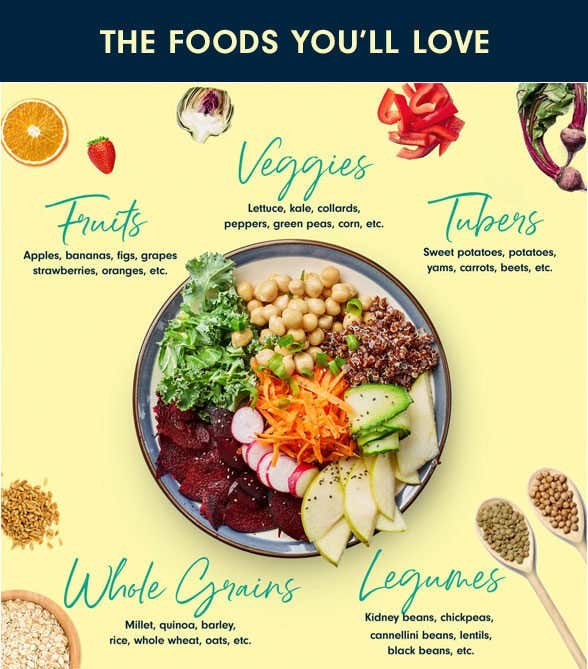Plant Based Chicken Meal Prep Ideas for Busy Professionals
Plant Based Chicken Meal Prep Ideas for Busy Professionals
Blog Article
All About Healthy Food: Benefits of Taking On Plant Based Choices
The conversation surrounding plant-based diet regimens has actually acquired substantial attention recently. Many individuals are checking out the possible health advantages, dietary advantages, and ecological influences connected with these dietary selections. As people end up being extra familiar with their food's influence on well-being and sustainability, inquiries develop about the functionalities of embracing such a lifestyle. What certain modifications can one anticipate, and exactly how might these selections reshape not only individual wellness however likewise the world's future?
Comprehending Plant-Based Diets
Although many individuals connect plant-based diet plans generally with vegetarianism or veganism, these diet regimens can include a wide variety of consuming patterns that prioritize whole, minimally refined plant foods. Such diet regimens often include fruits, veggies, whole grains, beans, nuts, and seeds, while restricting or getting rid of animal items. This adaptability permits people to tailor their nutritional options according to individual preferences and nutritional requirements. Some might take on a largely plant-based diet plan while still sometimes consuming meat or milk, commonly referred to as a flexitarian technique. The emphasis stays on including more plant foods, which can cause a diverse range of meals and tastes. Recognizing these various interpretations of plant-based eating is vital for appreciating its accessibility and allure in contemporary food society.
Health Perks of Plant-Based Foods
The wellness advantages of plant-based foods are substantial, using a nutrient thickness benefit that supports overall wellness. Study suggests that these foods can enhance heart wellness and play a vital role in reliable weight management. By integrating much more plant-based alternatives, people may enhance their nutritional options and advertise long-lasting wellness.
Nutrient Thickness Advantage
Nutrient thickness plays a vital role in the wellness advantages of plant-based foods, making them an engaging option for those looking for a balanced diet. Plant-based foods, such as fruits, vegetables, vegetables, nuts, and entire grains, are commonly rich in necessary vitamins, minerals, and antioxidants while being lower in calories. This high nutrient density enables people to eat less calories while still satisfying their nutritional needs. In addition, these foods are loaded with dietary fiber, advertising digestive health and wellness and helping in weight monitoring. By including nutrient-dense plant-based alternatives, customers can enhance their overall wellness, sustain their immune systems, and lower the danger of chronic conditions. Eventually, the nutrient density of plant-based foods emphasizes their importance in a health-conscious lifestyle.
Heart Health Renovation

Weight Management Support
In addition to promoting heart health, a plant-based diet regimen can significantly help in weight administration. This dietary method stresses whole foods such as fruits, veggies, beans, nuts, and entire grains, which are usually lower in calories and greater in fiber contrasted to animal-based items. The high fiber web content assists raise satiety, reducing general calorie intake. Plant-based diet plans are frequently rich in necessary nutrients while low in harmful fats, making it easier to preserve a healthy and balanced weight. Study shows that individuals who take on a plant-based way of living have a tendency to have lower body mass indexes (BMIs) and experience more effective weight-loss compared to those that take in meat-heavy diets. Embracing plant-based choices is a calculated option for efficient weight monitoring.
Nutritional Value of Plant-Based Active Ingredients
Plant-based components are abundant in crucial nutrients, providing a varied selection of vitamins, minerals, and anti-oxidants that contribute to general wellness. A comparison of healthy protein sources exposes that while pet products are typically deemed premium, several plant-based choices offer sufficient healthy protein and other advantageous substances. Comprehending the dietary value of these ingredients can help individuals make notified nutritional selections.
Vital Nutrients in Plants
Nutrient-rich ingredients discovered in plants offer a varied array of necessary nutrients that contribute considerably to general health and wellness. These ingredients are rich in vitamins A, C, and K, which sustain immune feature, vision, and blood clot, specifically. On top of that, plants supply important minerals such as calcium, magnesium, and potassium, crucial for heart health and wellness, muscle mass feature, and bone strength. The presence of fiber in plant-based foods aids food digestion and promotes a healthy gut microbiome. Anti-oxidants, found abundantly in vegetables and fruits, aid battle oxidative tension and decrease inflammation. Moreover, numerous plant foods are reduced in calories yet high in nutrients, making them an exceptional choice for those seeking to keep a healthy weight while making certain suitable nutrient consumption.
Contrasting Healthy Protein Sources
Healthy protein resources differ substantially in their dietary accounts, with plant-based active ingredients providing distinct advantages. Unlike pet proteins, which typically have hydrogenated fats and cholesterol, plant healthy proteins tend to be reduced in these harmful components. Legumes, nuts, seeds, and entire grains are rich in essential amino acids, fiber, vitamins, and minerals. Lentils give high healthy protein material alongside considerable iron and folate, while quinoa is a full protein, supplying all 9 essential amino acids. Additionally, plant-based healthy proteins are usually accompanied by anti-oxidants and phytochemicals that support overall health and wellness. The change to plant-based healthy protein resources not just enhances dietary intake yet likewise aligns with lasting nutritional techniques, lowering ecological effect and advertising lasting health benefits.
Environmental Impact of Plant-Based Consuming
As awareness of environment modification grows, numerous individuals are discovering sustainable nutritional options that can substantially reduce their environmental footprint. Plant-based eating has actually emerged as a considerable contributor to reducing greenhouse gas emissions, which are primarily associated with animals manufacturing. The cultivation of fruits, legumes, vegetables, and grains commonly calls for less resources, such as water and land, compared to pet farming. In addition, plant-based diets can lead to decreased deforestation, as less land is required for grazing livestock or expanding pet feed. By changing towards plant-based choices, customers can sustain biodiversity and advertise healthier communities. Generally, embracing plant-based consuming not just advantages individual health and wellness but likewise represents an essential action toward environmental sustainability and conservation initiatives.
Overcoming Common Misconceptions
While many people identify the benefits of a plant-based diet plan, several mistaken beliefs commonly hinder them from fully accepting this way of living. A common belief is that plant-based diets lack sufficient protein; however, countless plant resources, such as legumes, nuts, and tofu, provide sufficient protein. In addition, some think that this diet plan is costly, when as a matter of fact, staples like beans, rice, and seasonal vegetables can be quite inexpensive. One more misconception is that plant-based eating is overly restrictive, whereas it in fact offers a varied range of tastes and foods. Finally, several worry that a plant-based diet regimen might cause deficiencies, yet with proper planning, people can obtain all needed nutrients, including minerals and vitamins, while delighting in a wide array of scrumptious dishes.
Tips for Transitioning to a Plant-Based Way of life
Making the change to a plant-based way of living can be an enhancing experience, though it typically requires some assistance to browse the initial changes. Initially, individuals are encouraged to start progressively, including more fruits, vegetables, beans, and entire grains right into their meals while lowering meat and dairy products consumption. Dish planning is necessary; preparing a weekly food selection can help alleviate the modification and stop last-minute unhealthy options. Checking out brand-new dishes and cooking approaches can also preserve and enhance the experience excitement regarding plant-based eating. Additionally, signing up with support groups or neighborhoods can provide inspiration and share beneficial pointers. Lastly, remaining educated regarding nourishment warranties balanced dishes, preventing deficiencies while promoting a healthy and balanced, enjoyable plant-based lifestyle.
Delicious Plant-Based Dish Concepts
Discovering tasty plant-based dish ideas can inspire people to embrace a much more nutritious diet plan. One preferred choice is a hearty quinoa salad, featuring cherry tomatoes, cucumber, and a tangy lemon-tahini dressing. An additional favorite is a tasty lentil stew, packed with carrots, celery, and great smelling natural herbs, best for a comforting dinner. For breakfast, overnight oats made with almond milk, chia seeds, and covered with fresh berries provide a healthy begin to the day. Additionally, a dynamic vegetable stir-fry with tofu and a range of colorful veggies can be a quick yet satisfying dish. Creamy avocado salute on whole-grain bread, sprayed with flavors and seeds, provides an easy yet BBQ Sauces delicious treat. These meals showcase the selection and richness of plant-based eating.

Often Asked Concerns
Can a Plant-Based Diet Regimen Offer Sufficient Healthy Protein?
The question of whether a plant-based diet plan can give adequate protein is common. Many resources, consisting of vegetables, nuts, seeds, and entire grains, can meet healthy protein needs effectively, supporting a nutritious and well balanced diet regimen for individuals.
Are Plant-Based Diet Regimens Appropriate for Children?
The viability of plant-based diet regimens for children depends upon cautious preparation. Sufficient nutrients must be guaranteed, consisting of vitamins, minerals, and proteins. With appropriate assistance, such diets can sustain healthy and balanced development and growth in children.
Just how Do I Eat in restaurants on a Plant-Based Diet regimen?
Eating out on a plant-based diet plan includes looking for dining establishments with varied food selections, requesting modifications, and exploring vegan-friendly choices. Planning in advance and communicating nutritional choices can boost the eating experience while keeping nutritional selections.
What Are Usual Irritants in Plant-Based Foods?
Typical irritants in plant-based foods consist of soy, gluten, nuts, and seeds - Plant Based Chicken. People adhering to a plant-based diet should recognize these irritants and check out labels meticulously to stay clear of damaging reactions and assure secure consumption
Can Plant-Based Diets Help With Fat Burning?
Study indicates that embracing a plant-based diet regimen may assist in weight-loss as a result of its normally lower calorie density and greater fiber content. This mix can improve satiation, assisting individuals handle their caloric intake effectively. Lots of people associate plant-based diet regimens generally with vegetarianism or veganism, these diet regimens can include a broad variety of eating patterns that prioritize whole, minimally processed plant foods. Nutrient thickness plays a necessary duty in the health and wellness benefits of plant-based foods, making them a compelling selection for those seeking a well balanced diet regimen. Plant-based diet plans have been shown to noticeably enhance heart wellness, as they typically include elements that support cardiovascular function. In enhancement to advertising heart health and wellness, a plant-based diet plan can substantially help in weight administration. An usual idea is that plant-based diet regimens lack sufficient healthy protein; nonetheless, various plant resources, such as beans, nuts, and tofu, give ample healthy protein.
Report this page